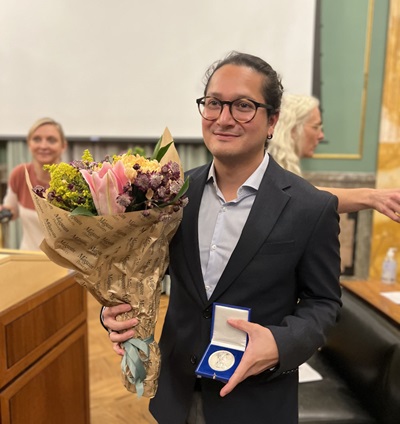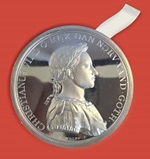CPop
Interview with José Manuel Aburto
Yesterday, during a festive ceremony, José Manuel Aburto was awarded a Silver Medal by the Royal Danish Academy of Sciences and Letters. It is a prestigious prize for outstanding young researchers in Denmark awarded to one person every year.
The Royal Academy rewarded José Manuel’s valuable contribution to the study of long-term global consequences of structural shocks, such as increased violence, and, most recently, the COVID-19 pandemic, and how these affect inequality in health and mortality.
— ‘I am delighted that Jose Manuel received the prestigious Silver Medal. It is a reward for his hard work, scientific breadth, and interdisciplinarity,’ says Annette Baudisch, CPop Director. ‘I am glad that the Royal Academy acknowledged the global impact and societal relevance of Jose Manuel’s work. In a way, I see this also as a festive day for demography in Denmark, with CPop and its researchers as the flagship,’ she adds.

José Manuel shared with us his feelings about receiving the prize, and thoughts about his research plans, and motivations to pursue a research career. You can read the interview with Jose Manuel below.
Q.: How do you feel about receiving the Silver Medal from the Royal Danish Academy of Sciences and Letters?
JMA: I am deeply honored by the Silver Medal from the Royal Danish Academy of Sciences and Letters and grateful to my CPop friends and colleagues at University of Southern Denmark, particularly the late Jim Vaupel. The Medal has been previously awarded to a list of distinguished researchers across many disciplines, and it is gratifying that Demography, the discipline that studies population dynamics, now belongs to this list. A significant part of my professional development and research has taken place in this beautiful country and I am indebted to my mentors, colleagues, and family that have supported all my projects. To a great extent this recognition belongs to them too.
Q.: What will you be using the grant that comes with the Silver Medal for?
The COVID-19 pandemic has had terrible consequences on population health and mortality around the world. While Denmark has been an exception, a significant part of the globe continues to suffer the consequences of this crisis. I will use the prize money to continue research on developing demographic models to aid in our understanding of the long term consequences of the pandemic in low-to-middle income countries and to strengthen collaborative networks among early career researchers from Latin America and Africa.
Q.: What part of your research work are you the most proud of?
Demography is an inclusive discipline. We collaborate with epidemiologists, biologists, sociologists and other social scientists. Throughout my career, I have been able to approach problems from very different perspectives thanks to the interdisciplinary nature of my discipline. I have done research on the impacts of violence on life expectancy in Latin America, more recently studied the impacts of the COVID-19 pandemic, as well as developed mathematical models to describe population change.
Q.: What in your research are you the most happy to be doing?
The breadth of research has required me to work with many people from various disciplines and countries. Having met and collaborated with such talented individuals, many of whom I consider my friends, ranks among the greatest rewards to conducting research. In addition, I experience great joy from witnessing the developments of the new generation of Demographers. Teaching and mentoring, developing new ideas and discussing old ones with my colleagues, as well as trying to find and tackle the big questions is where I find myself the happiest.
Q.: What’s next for you, workwise?
I will continue my work on inequalities in health and mortality in an international context. In addition, I am interested on how structural changes, such as increased violence in a country, affect demographic components including mortality and health, fertility intentions and migration. Given the many conflicts in the world, I believe this is a topic that deserves increased attention from an interdisciplinary perspective.
About the Silver Medal of the The Royal Danish Academy
 The Royal Danish Academy Silver Medal is awarded once a year to a researcher in Denmark under the age of 40 for a particularly significant thesis or overall scientific effort that has been published within the last five years. Every other year the prize goes to a humanities researcher, every other year to a natural science researcher. The Silver Medal comes with a grant of DKK 100,000, which must be used for the recipient's research.
The Royal Danish Academy Silver Medal is awarded once a year to a researcher in Denmark under the age of 40 for a particularly significant thesis or overall scientific effort that has been published within the last five years. Every other year the prize goes to a humanities researcher, every other year to a natural science researcher. The Silver Medal comes with a grant of DKK 100,000, which must be used for the recipient's research.
The assessment committee behind the awarding of the Society of Science's Silver Medal 2022 has consisted of Morten Bennedsen, Morten Rievers Heiberg, Knud Haakonssen, Karen Fog Olwig and Karen Skovgaard-Petersen.
Meet the researcher
José Manuel is an Assistant Professor at the Interdisciplinary Centre on Population Dynamics. His research focuses on the development of methodology to understand how populations and individuals survive to higher ages.